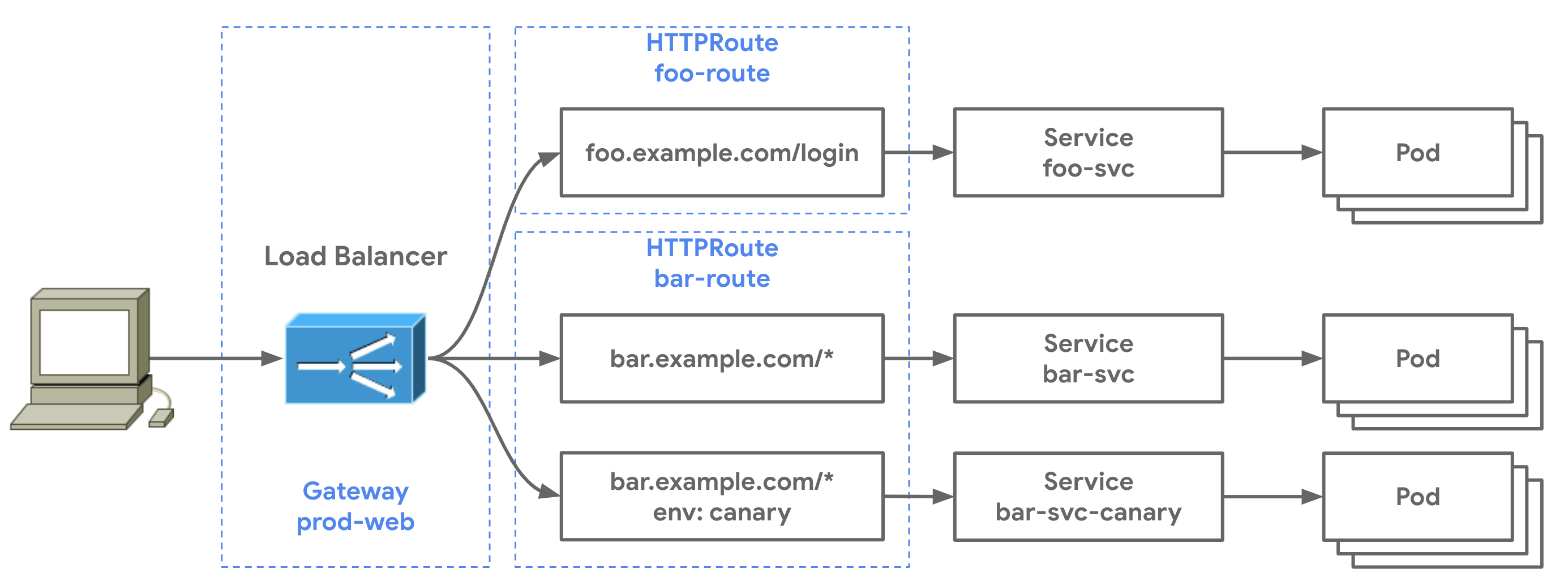HTTP routing¶
The HTTPRoute resource allows you to match on HTTP traffic and direct it to Kubernetes backends. This guide shows how the HTTPRoute matches traffic on host, header, and path fields and forwards it to different Kubernetes Services.
The following diagram describes a required traffic flow across three different Services:
- Traffic to
foo.example.com/loginis forwarded tofoo-svc - Traffic to
bar.example.com/*with aenv: canaryheader is forwarded tobar-svc-canary - Traffic to
bar.example.com/*without the header is forwarded tobar-svc

The dotted lines show the Gateway resources deployed to configure this routing
behavior. There are two HTTPRoute resources that create routing rules on the
same prod-web Gateway. This illustrates how more than one Route can bind to a
Gateway which allows Routes to merge on a Gateway as long as they don't
conflict. For more information on Route merging, refer to the HTTPRoute
documentation.
In order to receive traffic from a Gateway an HTTPRoute resource
must be configured with ParentRefs which reference the parent gateway(s) that it
should be attached to. The following example shows how the combination
of Gateway and HTTPRoute would be configured to serve HTTP traffic:
apiVersion: gateway.networking.k8s.io/v1
kind: Gateway
metadata:
name: example-gateway
spec:
gatewayClassName: example-gateway-class
listeners:
- name: http
protocol: HTTP
port: 80
---
apiVersion: gateway.networking.k8s.io/v1
kind: HTTPRoute
metadata:
name: example-route
spec:
parentRefs:
- name: example-gateway
hostnames:
- "example.com"
rules:
- backendRefs:
- name: example-svc
port: 80
An HTTPRoute can match against a single set of hostnames.
These hostnames are matched before any other matching within the HTTPRoute takes
place. Since foo.example.com and bar.example.com are separate hosts with
different routing requirements, each is deployed as its own HTTPRoute -
foo-route and bar-route.
The following foo-route will match any traffic for foo.example.com and apply
its routing rules to forward the traffic to the correct backend. Since there is
only one match specified, only foo.example.com/login/* traffic will be
forwarded. Traffic to any other paths that do not begin with /login will not
be matched by this Route.
apiVersion: gateway.networking.k8s.io/v1
kind: HTTPRoute
metadata:
name: foo-route
spec:
parentRefs:
- name: example-gateway
hostnames:
- "foo.example.com"
rules:
- matches:
- path:
type: PathPrefix
value: /login
backendRefs:
- name: foo-svc
port: 8080
Similarly, the bar-route HTTPRoute matches traffic for bar.example.com. All
traffic for this hostname will be evaluated against the routing rules. The most
specific match will take precedence which means that any traffic with the env:
canary header will be forwarded to bar-svc-canary and if the header is
missing or not canary then it'll be forwarded to bar-svc.
apiVersion: gateway.networking.k8s.io/v1
kind: HTTPRoute
metadata:
name: bar-route
spec:
parentRefs:
- name: example-gateway
hostnames:
- "bar.example.com"
rules:
- matches:
- headers:
- type: Exact
name: env
value: canary
backendRefs:
- name: bar-svc-canary
port: 8080
- backendRefs:
- name: bar-svc
port: 8080